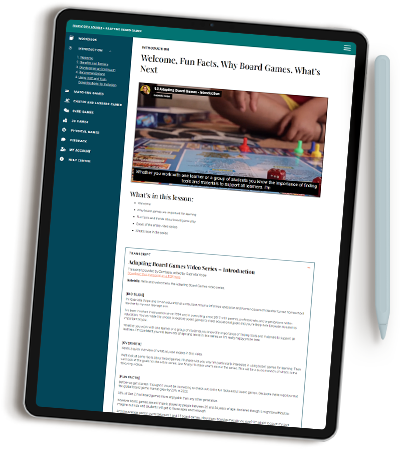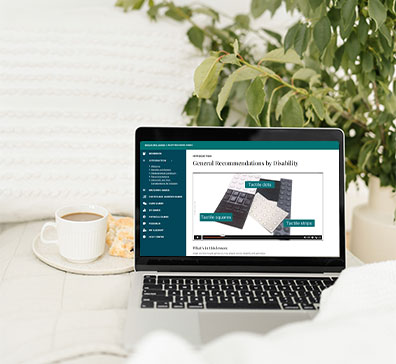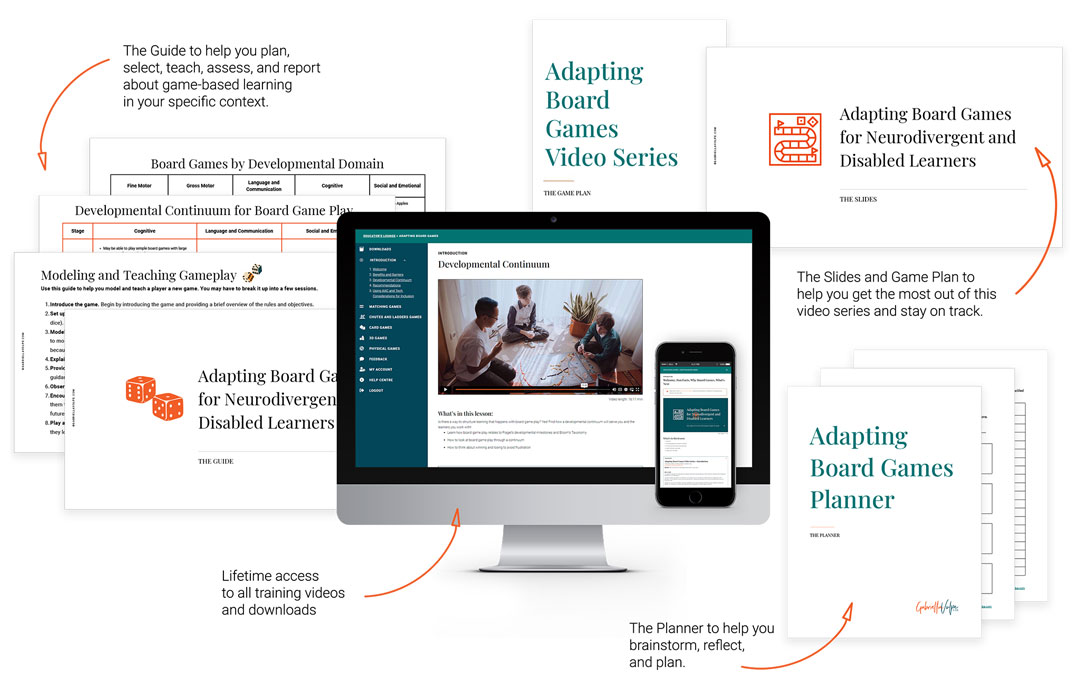Everyone should be included in board game play
Introducing
Adapting Board Games Video Series
For educators, teachers, therapists, tutors, parents, homeschoolers, or anyone wanting to start a gaming club!

~ Dr. Karen Purvis
Imagine if:
Research shows that board games help with:

What you will learn in this video series:
The tips learned in this series will help you transfer the ideas to other games and activities!
~ Kara Carrero
What you get in the Adapting Board Games Video Series:

10 bite-sized, self-paced video lessons containing:
- Education-based theories
- Adaptive strategies
- Examples of successful adaptations
Series checklist to keep you on track
PDFs including a guide, slides, and a planner
Access to additional free content as it gets added
Captioned videos
Transcripts
Lifetime access
Reference charts with language to guide you with lesson planning, assessments, and report writing:
- Steps for modeling and teaching gameplay
- Neurodiversity-affirming language to use during gameplay
- Proposed learning outcomes for game-based learning
- Subject-specific curriculum goals
- Domain-specific curriculum goals
- Assessment questions
- Developmental continuum for gameplay (not age-based)
- Evaluation rubric
- AAC game folder suggestions for gameplay
- Developmentally-appropriate board game suggestions
- List of board games by subject
- List of board games by developmental domain
- And, more!
The universal solutions offered in this series benefit all players, not just neurodivergent and disabled learners.
~ Vince Gowmon
I’m Gabriella Volpe, B.Ed. (she/her)
I am an educational consultant, licensed teacher, trauma-informed specialist, and mom to a disabled son.
I work to support accessible education for all types of learners.
I have been involved in education since 1994 and consulting with parents, professionals, and organizations since 2013.
My interest in board games has come due to the increase in popularity of board games and gameschooling. I have been thinking about adapting board games since I felt the pang of being left out. I see parents and educators post about new and fun games; I want to ensure my son gets an equal opportunity at gameplay. I want to be certain the children in your life do, too.
As I gently move my son away from toys, I am mindful of age-respectful play so that he can engage with peers, family, and friends of all ages—which I embed in this video series.
I have tried and tested the ideas in this series myself!
Are you ready to transform board games into accessible, inclusive experiences for all learners?
Answers to frequently asked questions
Closed
I don’t need another thing to do. Why should I care about adapting board games?
As parents and educators, we can no longer ignore the sensation that is gaming. We must embrace the benefits that include (but are not limited to) critical thinking, problem-solving, teamwork, leadership, and creativity—all skills necessary for 21st-century living.
Game-based learning is not an addition to what you’re already doing; it’s a compliment!
Students can either learn new concepts or apply the concepts learned through board games. Research shows that board games meet the AASL Standards for 21st-century learning and Bloom’s Taxonomy of Learning.
Further, board games can target subject-specific curriculum goals.
This video series focuses on offline games: good old-fashioned board games that gather family, friends, and classmates around a table while building on those same 21st-century skills—all while ensuring the inclusion of all players.
What if we don’t have a big budget for board games?
I chose the board game types for their availability and accessible pricing. Many of these games have dollar store versions that I recommend looking into first.
There is a second-hand board games market that I encourage you to explore—either online or at your local thrift store. Don’t forget about garage sales and your local library, too!
How do I get my administration to pay for this video series?
If you are an educator, therapist, tutor, etc., and you use board games with your students or clients, you shouldn’t have to pay out of pocket.
Please share the Board Games for Learning whitepaper with your administration to highlight the benefits of game-based learning and explore other board game products available. The cost of this resource can be covered through professional development budgets.
Invoices are provided upon request.
What additional materials will I need to purchase to implement the adaptations?
However, it’s a good idea to have:
- Transparent loop and hook dots (of various sizes) and strips (they sometimes come in rolls)
- Access to a printer or photocopier
- A variety of dice—with dots, numerals, and of different sizes (you can swap from other games)
- Painter’s tape of various colors
- Textured markers/dots
- Puffy paint/markers
You can find many of these items at your local dollar store.
What if I don’t have a lot of time to set this all up?
Further, using sturdy board games ensures the games last longer than printed materials that require constant preparation.
I notice that none of these games target subject-specific goals. How do I justify using these games for education?
Every game session offers a unique learning opportunity.
There’s a misconception that board games are only deemed “educational” if they are subject-specific games like math, science, or phonics games. This is untrue! All games are educational, and I share how so in this series.
I do include in “The Guide” subject-specific goals that board games target with language you can use for reporting (or simply because you geek out on that kind of thing as I do!).
I tend to buy courses like this and let them collect dust. How will this be different?
If seeing the excitement and progress in your learners isn’t enough to motivate you, I will send you a series of emails after purchase to remind you and keep you accountable.
I have a difficult time organizing my time. I get overwhelmed by things like this.
What's NOT included?
If you’re looking for a “rule book” with modifications to game rules, you won’t find that here. While I suggest modifying rules as a strategy (and I offer one or two ideas to spark the imagination), it would depend on each learner’s level and the type of adaption required. The ideas shared in the series are, for the most part, based on the game’s existing rules as a means for true inclusion.
However, maybe The Game Changer Toolkit might be what you’re looking for!
Is there a live component or a community group?
No. I believe we have enough going on. One more meeting and one more social media group is something we could do without. This training is asynchronous. You are welcome to work through it at your own pace and revisit it as often as you wish! I do send out a series of emails to keep you accountable. I also provide additional bits of information in those emails to help make board game play as accessible as possible.
What can I expect once I purchase?
You will be asked to create a username and password when you purchase the Video Series Course. As soon as your payment is processed, you will receive instant access to our members-only Educator’s Lounge.
Once you’re in, you will find the 10 videos, downloads, and transcripts waiting for you.
I suggest beginning with the welcome video to get oriented on the platform. Then to get acquainted with the entire video series, watch the introduction video in the “Adapting Board Games Video Series” section. There, you’ll find a series checklist you can use to guide you. But you are welcome to hop around to what you need most. You can view any of the videos anytime, however many times you’d like!
What is the refund policy?
What does “lifetime access” mean?
Can I get a Certificate of Completion?
Absolutely! Once you complete the series, you can notify Gabriella, who will send you a Certificate of Completion!
What’s in each lesson?
Introduction
- Welcome!
- Why board games are important for learning
- Fun facts and trends about board game play
- Goals of the entire video series
- What’s next in the series
Benefits & Barriers
- Learn the benefits of playing board games for neurodivergent and disabled learners.
- Find out the barriers to accessing board games.
Developmental Continuum
- Learn how board game play relates to Piaget’s developmental milestones
- How to look at board game play through a continuum
- How to think about winning and losing to avoid frustration
General Recommendations
Categories:
- Visual disabilities
- Hearing disabilities
- Physical disabilities
- Cognitive disabilities
- Social-emotional challenges
Using AAC and Tech
- How to incorporate AAC in board game play
- What to consider for inclusion
Matching Games
- Benefits of matching games for learning
- Barriers to playing matching games
- Tips for adapting matching games for inclusion
- Ideas for extension activities with matching game pieces
Chutes and Ladders Games
- Benefits of chutes and ladders games for learning
- Barriers to playing chutes and ladders games
- Tips for adapting chutes and ladders games for inclusion
Card Games
- Benefits of card games for learning
- Barriers to playing card games
- Tips for adapting card games for inclusion
3D Games
- Benefits of 3D games for learning
- Barriers to playing 3D games
- Tips for adapting 3D games for inclusion
Physical Games
- Benefits of physical games for learning
- Barriers to playing physical games
- Tips for adapting physical games for inclusion
Transparency Note
I believe in being upfront and transparent with my community. That’s why I want to share the true value of the “Adapting Board Games Video Series.” This series is jam-packed with valuable insights and practical strategies that are easily worth hundreds of dollars.
However, I’m currently offering it for $75 USD. Why? I want to make it accessible to as many people as possible and help bring more visibility to the diversity and quality of my work. The price of this series will likely go up in future.
By offering it at $75 USD, I hope to allow more parents, educators, tutors, and therapists to benefit from this series’s value—and bring more learners to board games!
I invite you to take advantage of this offer and get your game on!

